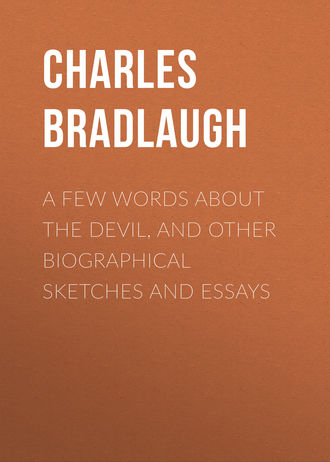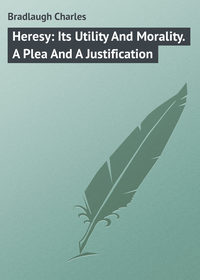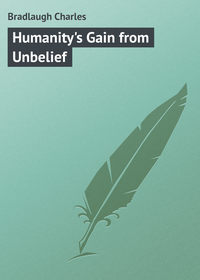 полная версия
полная версияA Few Words About the Devil, and Other Biographical Sketches and Essays
2. The Legislature should declare that leaving cultivable land uncultivated gave the Government the right to take possession of such land, assessing it by its actual return for the last live years, and not by its real value, and handing to the proprietor the amount of, say, twenty years' purchase in Consolidated Stock, redeemable in a limited term of years. The land so taken should not be sold at all, but should be let out to persons willing to become cultivators, on sufficiently long terms of tenancy to fairly recoup his labor and capital to the cultivator, who should yearly pay into the National Treasury, in lieu of all other imperial taxes, a certain proportion of the value of the annual produce.
3. The game laws should be abolished. Game preserving in England is not only injurious, in that it diverts land capable of corn-bearing from the purpose it should fulfill, of growing corn to feed the starving, but it is injurious in that it prevents proper cultivation of surrounding farms, and demoralizes and makes criminals of the neighboring agriculturial laborers, creating for them a kind and degree of crime which would be otherwise unknown. Poaching, which is so severely punished, is actually fostered and encouraged by the very landholders who punish it. Pheasants and partridges' eggs are bought to stock preserves; the gamekeepers who buy these eggs shut their eyes to the mode in which they have been procured. The lad who was encouraged to procure the eggs finds himself in jail when he learns that shooting or trapping pheasants gains a higher pecuniary reward than leading the plow horse, or trimming the hedge, or grubbing the plantation. Poaching is the natural consequence of rearing a large number of rabbits, hares, partridges, and pheasants, in the midst of an underpaid, underfed, badly-housed, and deplorably ignorant body of people. The brutal outrages of gamekeepers of which we read so much are the regretable but easily-traceable measure of retaliation for a system which takes a baby child to work in the fields soon after six years of age, which trains all his worst propensities and deadens and degrades his better faculties, which keeps him in constant wretchedness, and tantalizes him with the sight of hundreds of acres on which game runs and flies well-fed, under his very nose, while he limps ill-fed along the muddy lane which skirts the preserve – game, which is at liberty to come out of its covert and eat and destroy the farmer's crop, but which is even then made sacred by the law, and fenced round by covenants, as in a Leitrim lease. The game laws must go; they starve our population by using land which might be golden to the autumn sun with the waving crop of wheat, barley, and rye; they feed our prisons, and rear a criminal class in our midst, who have to be prosecuted and guarded at great cost, and all because hares and pheasants are higher in the landowners' eyes than human beings.
5. Any person holding more than, say, 5,000 acres of land, should be taxed at a far heavier rate than those having smaller holdings. That is, presuming, in order to take a figure as basis, the land-tax on 5,000 acres to be at the rate of 1s. per acre, then on every acre above that quantity it should be 2s. per acre up to 10,000 acres, and from thence 5s. per acre up to 15,000 acres, and from thence 10s. per acre up to 20,000 acres, so as to discourage all extravagantly large holdings.
6. The law of primogeniture should be repealed; the settlement of property, except for a widow and her children, be entirely prohibited and some limitation should be put on the power of devise, so as to prevent, say, the Marquis of Westminster from leaving the bulk of his property to his eldest son, while the younger ones are left as noble paupers, to be provided with places and pensions by the nation. Land should be made as easily and as cheaply transferable as any personal chattel.
The present land monopoly must be broken by legislation, or it will be destroyed by revolution.
1
Leviticus xvii, 7.
2
Luke iv, 2.
3
Luke iv, 2.
4
1 Chron. xxi, 1; 2 Sam. xxiv, 1.
5
G. R. Gliddon's extract from "Land's Sagra Scritura," chap. iii, sec. 1.
6
"Who was Jesus Christ?" p. 8.
7
*"Christian Records," by the Rev. Dr. Giles, p. 144.
8
Luke iv, 35, 36.
9
Matt, xxv, 41.
10
Jude, 9.
11
Jude, 9.
12
Rev. xxi, 10.
13
Genesis iii, 4, 5, 22.
14
Zechariah iii, 1.
15
John vi, 70.
16
John vi, 70.
17
2 Chron: xi, 15.
18
Luke x, 18.
19
Luke xxii, 31.
20
1 Tim. i, 20.
21
"Pilgrim's Progress from Methodism to Christianity."
22
Gen. xxv, 23.
23
Gen. xxv, 30.
24
Douay version.
25
Genesis xxxi, 24, Douay version.
26
Acts, vii, 21.
27
Hebrews, xi, 24.
28
Acts, vii, 25.
29
Genesis xxii, 14.
30
Numbers xi.
31
Exodus xxxii, 35.
32
Ib. xxxiii, 11.
33
Ib. xxxiii, 20.
34
Ib. xxiv,9.
35
Gliddon's Types of Mankind: Mankind's Chronology, p. 711.
36
Jude, v. 9.
37
Questiones Mosaicæ, p. 488.
38
Questiones Mosaicæ p. 418.
39
Matthew v, 3.
40
Luke vi, 29.
41
Last trail by Jury for Atheism."
42
Luke vi, 29, 30.
43
Luke vi, 20.
44
Luke vi, 24.
45
Luke xvi, 19 – 81.
46
Luke xvi, 19 – 81.
47
Luke vi, 25.
48
Luke vi, 31.
49
Matthew v, 4.
50
Matthew xix, 19.
51
Matthew x, 14,15.
52
Luke xiv, 26.
53
Matthew x, 84 – 86.
54
Mark xvi,16
55
Matt. x, 5.
56
John i, 11.
57
Luke xv, 7.
58
Luke 7, 47.
59
Luke xv, 27.
60
Matt xxi, 18-22; Mark xi, 12-24.
61
Luke xix, 26,17.
62
Matt, xxv, 41.
63
Matt. xix, 12.
64
Matt, xxiv, 41.
65
"Aids to Reflection," 1843, p. 200.
66
"History of Civilization," vol. i, p. 14.
67
Luke, xxii, 44.
68
John, xvii, 2.
69
Matthew iv, 18-22.
70
Luke v,1-11.
71
Luke iv, 88.
72
Matthew viii, 14.
73
Devil's Pulpit, vol. i., p. 148.
74
Matt, xiv, 23; Mark vi, 45.
75
Matt. xvi, 17.
76
Matt, xiv, 33.
77
Matt. xxvi, 34.
78
Luke xxii, 34.
79
John xiii, 38.
80
Mark xiv, 68.
81
Luke xxii, 57., Luke xxii, 58., Luke xxii, 61.
82
Mark xiv, 69.
83
Sharpe's History of Egypt, page 196.
84
Harmony of the Four Evangelists, and Harmony of the Old Testament.
85
Munk's Palestine, p. 231.
86
"Types of Mankind," Dr. Nott, p. 57.
87
M. Pulzsky on Iconography – "Indigenous Races," p. 111.
88
"Types of Mankind," p. 58.
89
"Indigenous Races of the Earth," p. 458. The alleged discovery of white-skinned negroes in Western Africa does not affect this question: it is not only to the color of the skin, but also the general negro characteristics that the above remarks apply.
90
Nott and Gliddon, "Indigenous Races," page 687.
91
Gliddon's "Types of Mankind," page 335.
92
"Types," pages 336 to 369.
93
"Types," pages 350 and 357.
94
"Archaia," by Dr. Dawson.
95
"Archaia," page 306.
96
In Sir William Hamilton's Essay on Cousin, I find a note quoting Mr. Piesse on Kant, in which the word God stands as the equivalent for a phase of the unknowable.








